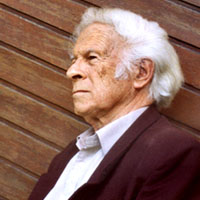Székely Erik
(02. 01. 1927)
Székely Erik
La Corne-du-Bois
CH-2027 Montalchez (NE)
Suisse
Tel: +41 (0)32 835 10 72
La Corne-du-Bois
CH-2027 Montalchez (NE)
Suisse
Tel: +41 (0)32 835 10 72
Genre: Classical Music
Biography
* 02. 01. 1927.
Erik Székely was born into a musical family in Lugano; his father is a Hungarian and his mother a Scot. After relocating many times he finally settled in Neuenburg. He began his studies at Lausanne and Geneva conservatories after profiting greatly from his fathers instruction in music, he had hardly graduated before he attempted his first composition with assistance from Zoltán Kodály and Tibor Harsányi. His development as a composer is defined in an independently artistic way.
He was rewarded at the international composers competition of Vercelli (1951), Genoa (1952) and Liège (1953). He was presented with the prize awarded by the culture foundation of the 'Neuenburger Kantonalbank' for his life's work in 1999. From 1960 until 1989 he was dedicated to the teaching of music (piano, theory of harmony and introduction) at colleges in Neuenburg - mainly at the canton college of Neuenburg.
Erik Székely was born into a musical family in Lugano; his father is a Hungarian and his mother a Scot. After relocating many times he finally settled in Neuenburg. He began his studies at Lausanne and Geneva conservatories after profiting greatly from his fathers instruction in music, he had hardly graduated before he attempted his first composition with assistance from Zoltán Kodály and Tibor Harsányi. His development as a composer is defined in an independently artistic way.
He was rewarded at the international composers competition of Vercelli (1951), Genoa (1952) and Liège (1953). He was presented with the prize awarded by the culture foundation of the 'Neuenburger Kantonalbank' for his life's work in 1999. From 1960 until 1989 he was dedicated to the teaching of music (piano, theory of harmony and introduction) at colleges in Neuenburg - mainly at the canton college of Neuenburg.
Work list
Nocturne (1950)
Instrumentation: for horn solo and chamber orchestra (1.1.1.1/1.0.0.0/pf/str)
Duration: 5' 00"
Manuscript
A Enide (1951)
Two melodies
Instrumentation: for soprano and piano
Texts: Guillaume Apollinaire
Clotilde - Le présent.
Duration: 4' 00"
Manuscript
Instrumentation: for soprano and piano
Texts: Guillaume Apollinaire
Clotilde - Le présent.
Duration: 4' 00"
Manuscript
Quatuor à cordes (1953)
Preludio elegiaco - Vivacissimo (homage to Béla Bartók) - Blues - Allegro fugato (homage to Zoltán Kodály).
Duration: 8' 00"
Manuscript
Pastourelle (1954)
Instrumentation: for oboe and two horns
Based on mediaeval Hungarian melodies.
Duration: 3' 30"
Manuscript
Aubade et Séquence (1954)
Instrumentation: for four horns
Duration: 8' 00"
Manuscript
Les désolences (1954)
Three melodies
Instrumentation: for alto and piano
Texts: Guillaume Apollinaire
Automne - Cors de chasse - L'Adieu.
Duration: 5' 00"
Manuscript
Instrumentation: for alto and piano
Texts: Guillaume Apollinaire
Automne - Cors de chasse - L'Adieu.
Duration: 5' 00"
Manuscript
Trois choeurs (1957)
Instrumentation: for a-cappella choir (SAT)
Texts: Anonymus
Based on anonymous thirteenth century chansons. Chanson à refrain - Chanson - Renverdie.
Duration: 6' 00"
Manuscript
Garrigues (1958)
Instrumentation: for piano
Duration: 6' 00"

Music for three strings (1963)
Prélude - Variations - Final.
Duration: 14' 00"
Manuscript
Le vent nocturne (1964)
Instrumentation: for soprano and piano
Texts: Guillaume Apollinaire
Text: Guillaume Apollinaire.
Duration: 3' 30"

Elégie et Allegro non troppo (1960-1966)
Instrumentation: for horn and piano
Duration: 5' 00"
Manuscript
Interlude (1971)
Instrumentation: for clarinet and violoncello
Duration: 3' 00"
Manuscript
Rhodoraies (1975)
Meditations on two associations of alpine vegetables
Instrumentation: for horn and piano
Duration: 9' 00"
Instrumentation: for horn and piano
Duration: 9' 00"
Maurice et Pierre Foetisch
5-7 rue de l'Ancien-Port
CH-1201 Genève
Suisse
Tel. +41 (0)22 738 91 10
Fax +41 (0)22 738 91 16
sidomusic@sidomusic.com
www.sidomusic.com
CH-1201 Genève
Suisse
Tel. +41 (0)22 738 91 10
Fax +41 (0)22 738 91 16
sidomusic@sidomusic.com
www.sidomusic.com
Suite symphonique d'après Paul Klee (1956-1984)
Instrumentation: for orchestra (pic.2.2.ca.2(piccl).bcl.2.cbn/3.3(pictpt,cnt).2.1/3perc./pf.cel/str)
In four acts: Image d'hiver, Ville pavoisée, Paysage aux oiseaux jaunes, Sacrifice barbare.The work is a meditation based on the following cocepts: Universe (movements one and three), Man (movements two and four).
Duration: 20' 00"

Transmutations (1987)
Instrumentation: for twelve string instruments (3.3.3.3)
Duration: 5' 00"
Manuscript
Polarisation (1989)
Instrumentation: for brass ensemble (6tpt(3pictpt).6tbn(atbn).tba.ctbn) piano, celesta and two percussion
Réflexion - Fluorescence - Phosphorescence - Déflexion - Diffraction - Réfraction.
Duration: 12' 00"

Crast' Agüzza (1991)
Instrumentation: for six horns
Duration: 6' 00"

Signifiances (or the tale of King Arthur) (1996)
Instrumentation: for orchestra (2(pic).1(obda).ca.1(bthn).bcl.2(cbn)/2.2(pictpt).1.0/1perc/pf/str)
Dans un an et un jour... - La quête suprême - Joie de la Cort.
Duration: 16' 00"

Longimirance (2000)
Instrumentation: for strings min: (6.6.4.4.2), piano and percussion
Duration: 9' 00"

Discography
Schweizer Hornquartette (Vol. I) (Musiques Suisses Nr. 6226, 2005)
Moser, Roland: Ton in Ton (1990/1997)
With more works of: Templeton Strong, Ernst Widmer, Daniel Lienhard, Klaus Cornell, Andreas Pflüger
Interpreters:
Dauprat-HornquartettWorks:
Székely, Erik: Aubade et Séquence (1954)Moser, Roland: Ton in Ton (1990/1997)
With more works of: Templeton Strong, Ernst Widmer, Daniel Lienhard, Klaus Cornell, Andreas Pflüger
Info: www.fonoteca.ch
Last updated: 2024-11-23 11:13:06